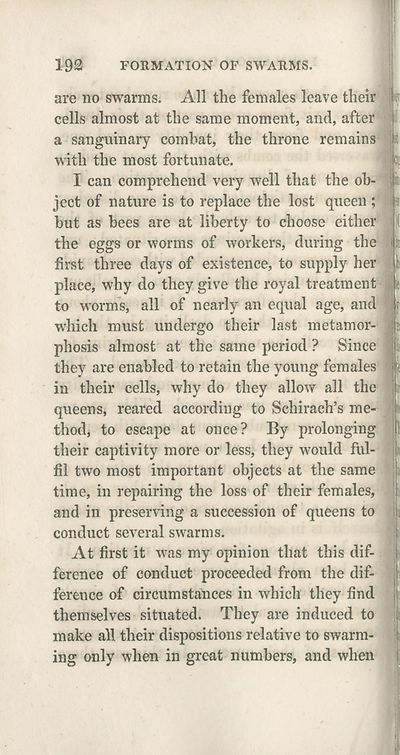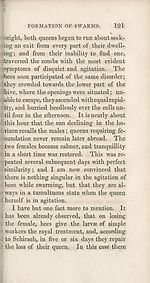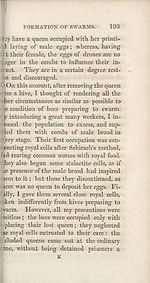Download files
Complete book:
Individual page:
Thumbnail gallery: Grid view | List view

192 FORMATION OF SWARMS.
are no swarms. All the females leave their
cells almost at the same moment, and, after4 ;
a sanguinary combat, the throne remains-
with the most fortunate.
I can comprehend very well that the ob¬
ject of nature is to replace the lost queen ;f
but as bees are at liberty to choose either
the eggs or worms of workers, during the j
first three days of existence, to supply her
place, why do they give the royal treatment !
to worms, all of nearly an equal age, and j
which must undergo their last metamor-
phosis almost at the same period ? Since
they are enabled to retain the young females
in their cells, why do they allow all the
queens, reared according to Schirach’s me- -
thod, to escape at once? By prolonging j
their captivity more or less, they would ful¬
fil two most important objects at the same
time, in repairing the loss of their females, |
and in preserving a succession of queens to |
conduct several swarms.
At first it was my opinion that this dif- |
ference of conduct proceeded from the dif- |
ference of circumstances in which they find |
themselves situated. They are induced to |
make all their dispositions relative to swarm- |
ing only when in great numbers, and when '
are no swarms. All the females leave their
cells almost at the same moment, and, after4 ;
a sanguinary combat, the throne remains-
with the most fortunate.
I can comprehend very well that the ob¬
ject of nature is to replace the lost queen ;f
but as bees are at liberty to choose either
the eggs or worms of workers, during the j
first three days of existence, to supply her
place, why do they give the royal treatment !
to worms, all of nearly an equal age, and j
which must undergo their last metamor-
phosis almost at the same period ? Since
they are enabled to retain the young females
in their cells, why do they allow all the
queens, reared according to Schirach’s me- -
thod, to escape at once? By prolonging j
their captivity more or less, they would ful¬
fil two most important objects at the same
time, in repairing the loss of their females, |
and in preserving a succession of queens to |
conduct several swarms.
At first it was my opinion that this dif- |
ference of conduct proceeded from the dif- |
ference of circumstances in which they find |
themselves situated. They are induced to |
make all their dispositions relative to swarm- |
ing only when in great numbers, and when '
Set display mode to:
![]() Universal Viewer |
Universal Viewer | ![]() Mirador |
Large image | Transcription
Mirador |
Large image | Transcription
| Antiquarian books of Scotland > Curiosities & wonders > New observations on the natural history of bees > (210) |
|---|
| Permanent URL | https://digital.nls.uk/128808387 |
|---|
| Description | Thousands of printed books from the Antiquarian Books of Scotland collection which dates from 1641 to the 1980s. The collection consists of 14,800 books which were published in Scotland or have a Scottish connection, e.g. through the author, printer or owner. Subjects covered include sport, education, diseases, adventure, occupations, Jacobites, politics and religion. Among the 29 languages represented are English, Gaelic, Italian, French, Russian and Swedish. |
|---|

